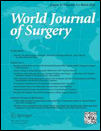Geographical Inequalities in Access to Bellwether Procedures in Brazil
Supplementary Information: The online version contains supplementary material available at https://doi.org/10.1007/s00268-022-06855-9.
Copyright comment: Springer Nature or its licensor (e.g. a society or other partner) holds exclusive rights to this article under a publishing agreement with the author(s) or other rightsholder(s); author self-archiving of the accepted manuscript version of this article is solely governed by the terms of such publishing agreement and applicable law.
Abstract
Background
Brazil is a middle-income country that aims to provide universal health coverage, but its surgical system's efficiency has rarely been analyzed. In an effort to strengthen surgical national systems, the Lancet Commission on Global Surgery proposed bellwether procedures as quality indicators of surgical workforces. This study aims to evaluate regional inequalities in access to bellwether procedures and their associated mortality across the five Brazilian geographical regions.
Methods
Using DATASUS, Brazil's national healthcare database, data were collected on the total amount of performed bellwether procedures—cesarean section, laparotomy, and open fracture management—and their associated mortality, by geographical region. We evaluated the years 2018–2020, both in emergent and elective conditions. Statistical analysis was performed by one-way ANOVA test and Tukey's multiple comparisons test.
Results
During this period, DATASUS registered 2,687,179 cesarean sections, 1,036,841 laparotomies, and 648,961 open fracture treatments. The access and associated mortality related to these procedures were homogeneous between the regions in elective care. There were significant geographical inequalities in access and associated mortality in emergency care (p < 0.05, 95% CI) for all bellwether procedures. The Southeast, the most economically developed region of the country, was the region with the lowest amount of bellwether procedures per 100,000 inhabitants.
Conclusion
Brazil's public surgical system is competent at promoting elective surgical care, but more effort is needed to fortify emergency care services. Public policies should encourage equity in the geographic allocation of the surgical workforce.




